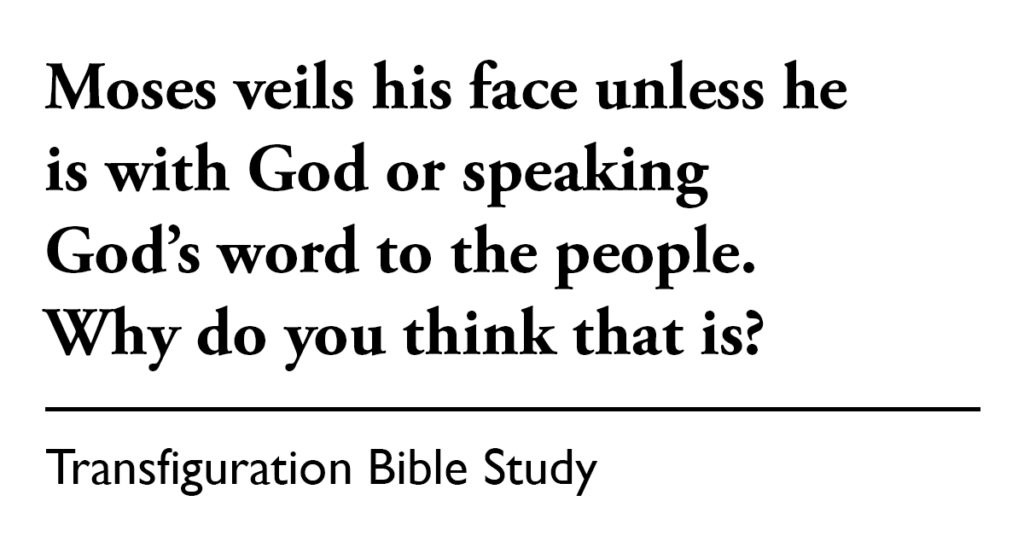Bible Study: Transfiguration – August 6, 2023
August 06, 2023
RCL: Exodus 34:29-35; Psalm 99 or 99:5-9; 2 Peter 1:13-21; Luke 9:28-36

Exodus 34:29-35
Moses returns to the people with the gift of the tablets of the covenant in his arms. He has been speaking with God “face to face, as one speaks to a friend” (Ex 33:7-11). The Israelites stand in awe of the startling effect of Moses’ shining face. And the people are frightened by the change in him.
Moses calls the people close to hear God’s most holy words to them and to share in the renewed covenant. Eventually, despite their fear of the change in him, they come—the radiance of his face evidence of God working within him.
Don’t we long to be in the presence of our Creator? We pray for that very thing, to see the face of God, to be there with the Presence, to know what it is like. And indeed, it is a scary thing, knowing we will certainly be changed by the experience. Might others turn away, afraid of our shining faces and the truth we speak?
- Moses veils his face unless he is with God or speaking God’s word to the people. Why do you think that is?
- How is your faith visible to others?
- What has been your experience of speaking God’s word to others? Do you think they see you differently afterward
Psalm 99
Psalm 99 is the last of the “enthronement psalms” where we have a vision of God seated above all in the highest of holy places: in this case, upon the very Ark of the Covenant. In her translation of Psalm 99, Nan Merrill writes, “Awaken you people! Entrust your hearts to Love” (Psalms for Praying: An Invitation to Wholeness). In the face of very Love, the leaders of the world bow down and proclaim the mighty King, the lover of justice, who brings equity.
The psalmist, keenly aware of the failings of human kings and of the effect of their failings on the people, recalls for them their ancestral relationship with the Lord God. God is a king who can be relied upon to bring justice and mercy, while also holding us accountable. There are safety and assurance in boundaries and covenant. We know where God stands: God stands with us.
“Awaken you people, entrust your hearts to Love.”
- Where do you find boundaries and structure help you in your relationship with God and others?
- Are there “lesser gods” in your life that compete for your time with the Beloved?
2 Peter 1:13-21
The author of 2 Peter is obviously concerned about authority, credibility, and trust. We aren’t sure to whom he is referring when he contrasts “cleverly devised myths” with the eyewitness account of the Transfiguration. His are not words of boasting, but of concern that the readers or listeners know the truth of Jesus Christ, the Beloved Son of the Majestic Glory.
The writer also makes it clear that the Bible is a powerful and dangerous text, not to be interpreted without careful discernment and reliance upon the Spirit as mediator. In the Early Church, it was important (as it is for us today) to have confidence in those that interpreted Scripture. Prophecy never begins and ends with human beings, but from and with the Holy Spirit who enlightens our efforts, that the Word may serve as a lamp to illumine our hearts.
- With the many interpretations of truth that swirl around us, where do you look for guidance and counsel?
- This letter, purportedly written by Peter, apostle of Jesus, was most likely written by a later prophetic author. How does that change, if at all, how we might unlock our own interpretation of the “eyewitness” testimony?
Luke 9:28-36
The telling of the Transfiguration is found in all three synoptic gospels. All have similar elements – Jesus’ changing appearance, his shining face and dazzling white garments, the appearance of Moses and Elijah, and the cloud from which God affirms Jesus’ authority, giving a foretaste of his glory as the Son of the Most High. The differences in Luke’s gospel lie in some specifics related to the conversation Jesus has with Elijah and Moses.
“They appeared in glory and were speaking of his departure, which he was about to accomplish at Jerusalem.” Here Moses and Elijah, the Law and the Prophets, bear witness to Jesus’ departure, his exodus, as still another saving act of God. Jesus and his companions will now begin the journey, traveling from the mountaintop to the valley, and from there the glory of God in Christ Jesus will be made known to all the nations.
We can’t blame Peter for wanting to hold onto the three shining figures transfigured by their proximity to the Holy One. How many times have we experienced the shining of Christ in our lives in a moment of inspired worship and prayer, only to find the image fading days or perhaps hours later? Unfortunately, we can’t stop time. Perhaps what we might seek to transfigure is how we see the world in the light of Christ, and then to reflect that out to the world.
- What are some ways we can listen to Jesus’ voice that might transfigure our lives?
- How do you shine the light of Christ in small and not-so-small ways?
This Bible study was written by Sandi Albom of the Episcopal Divinity School in 2017.
¡No olvide suscribirse al podcast Sermons That Work para escuchar este sermón y más en su aplicación de podcasting favorita! Las grabaciones se publican el jueves antes de cada fecha litúrgica.


